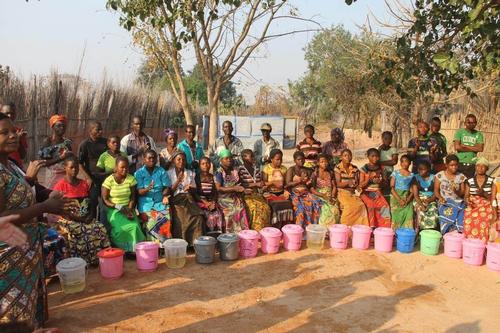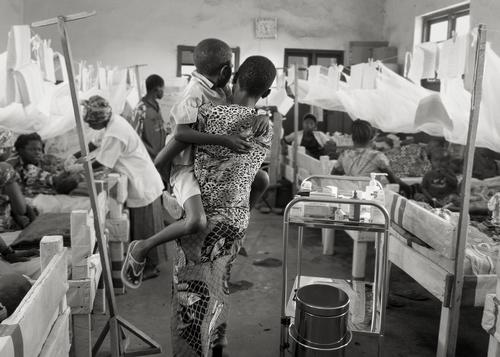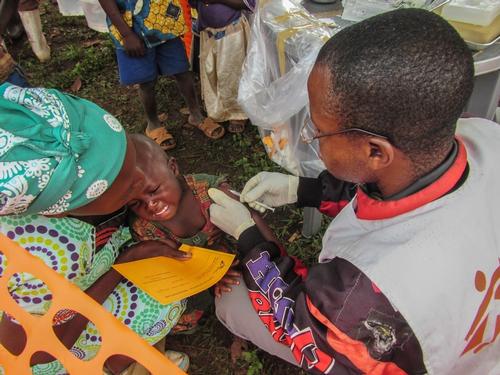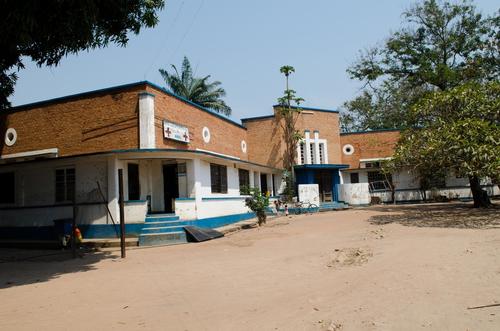Behind Shamwana hosptital in Tanganyika province, southern Democratic Republic of Congo (DRC), there is a small village. It has a newly constructed bamboo barrier, behind which lives a community that MSF helped to create, for a few weeks at least. Practically speaking, it cannot truly be called a village – but it is undoubtedly a community, though a small one of less than 80 people. Most are not locals of Shamwana, but have recently arrived from across the province. They live communally in five large tents, sharing their meals and taking care of one another. There is something extraordinary about this ‘village’, as if there was an invisible wall surrounding them, not only separating them from the rest of the world, but also unifying them from their own world within.
The ‘village’ is comprised of 40 women and their caretakers. The entrance gate has a ‘VVF Camp’ sign attached. VVF stands for vesico-vaginal fistula. These people, mostly women, have travelled to Shamwana to be part of the VVF camp that MSF is organizing from the beginning of July until the end of August 2016. Within this timeframe, for a four-week period, a specialist surgeon is performing delicate operations to repair the fistulas of these women. A fistula is a small hole between the bladder and vagina and/or rectum, which causes chronic incontinence. For most women, fistulas are manifested from prolonged and/or obstructed labour without medical intervention, most commonly during home births. It is one of the most severe consequences of a complicated delivery, but in most cases should be a preventable condition. A woman who receives appropriate prenatal care and assistance during delivery will, most probably, not suffer from a fistula. The prevalence of fistulas among child-bearing women in a given population can therefore be viewed as an incidental indication of a dysfunctional health system. Although each woman in the VVF camp has a unique story, they have come together for a similar treatment and a common goal: to heal. It is a physical and psychological journey that requires not only a surgeon, but also a team of nurses, midwives, mental health officers, caretakers and, perhaps most importantly, fellow patients. During a time of extreme vulnerability, both due to their physical condition and cautious hope for healing, these women form the pillars of a newly established community.
When entering the gate I come across a swirling of sounds and smells. From the third tent along, a woman is encouraging her neighbor to drink more water in preparation of her surgery tomorrow. From another tent, a cautious group celebration can be heard as the first urine drops enter a patient’s catheter. Under the tukul (house), the smells of boiling oil rise; the ‘village cook’ is preparing mbuzi (goat) and bukari (manioc) for dinner. Beside a central tree, community mobilizer Mama Jolie is heard singing, contagiously encouraging the women to sway along. Later that same day, the village-appointed priest can be observed guiding a mixture of religions through one common prayer, while in a corner, midwife Dorothea can be overheard discussing the surgery schedule with the ‘village chief’, himself a caretaker of one of the patients.
Overcome by impressions, I enter the first tent, which is the post-operation area. Six women lie on their beds, at ease, chatting with the two nurses who sit among them. Before anything, nurse Gerardine cries out: “It’s 3pm, everybody drink!” Plastic bottles appear from under pagnes (cloths) and one hears the sound of water that is being swallowed with conviction. A woman in the far-left corner looks around curiously before her neighbor shouts: “You heard them: drink!” The women laugh, turn on their backs, and cheer encouragingly. Outside, their husbands carry buckets of water, replenishing for the next hour.
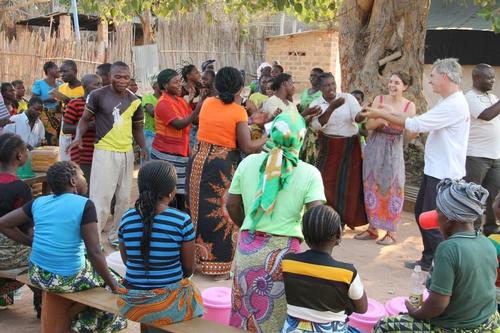
After passing the second and third tent, which are empty, one sees the ‘villagers’ sitting in a circle under the tree. From a distance, nurse Ravel observes them. “They arrived hesitant and questioning,” she says. “Is this really true? Is it possible to be healed? They had lost a part of their self-value. Even when they would visit a health centre, they would be placed in a corner to hide their smell. But here, there is no shame. We are here for them, with them. As one by one the women come back from surgery, I see their confidence growing. The most common three words I hear are a doubtful and wondrous: ‘are you dry?’ Their bond is the beginning of their return to society.” As he speaks, he gazes at the colorful bodies under the tree. Some are dancing, some are swaying, and some stay close to their buckets.
It is a community that is united in its shared understanding of the reality of living with a fistula. When their own homes may have expelled them, this ‘village’ offers acceptance, empathy and, ultimately, inclusion. Testifying to the power of this community, one woman shares, “those for whom the surgery is unsuccessful, we have decided to create our own fistula village. We will live together in dignity.”
Exiting through that same gate at the end of the day, I realize that it is the unity of the ‘villagers’, more than the physical fence, that sustains their circle of protection. In a matter of days, 40 women with unfathomable strength have started to lay their own path towards physical and psychological healing – with dignity, in solidarity.



